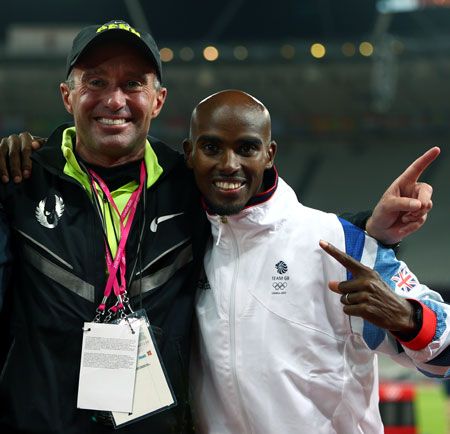Mo Farah, who last year became only the second man to retain the Olympic 5,000 and 10,000-metre titles, said in a statement that he is "a clean athlete who has never broken the rules in regards to substances, methods or dosages."
 Alberto Salazar, the coach of Britain's Olympic champion Mo Farah, has been accused of using prohibited infusions of supplements to improve the performance of his runners, the Sunday Times reported citing a leaked United States Anti-Doping Agency (USADA) report.
Alberto Salazar, the coach of Britain's Olympic champion Mo Farah, has been accused of using prohibited infusions of supplements to improve the performance of his runners, the Sunday Times reported citing a leaked United States Anti-Doping Agency (USADA) report.
The British newspaper said the 2016 report also accused Salazar of abusing prescription medicines for his athletes at the Nike training centre in Oregon.
Attempts by Reuters to reach Salazar for comment were unsuccessful.
Salazar issued a lengthy and detailed denial of similar allegations in 2015.
Farah said in a statement on Sunday that he is "a clean athlete who has never broken the rules in regards to substances, methods or dosages."
Farah, who last year became only the second man to retain the Olympic 5,000 and 10,000-metre titles, accused the newspaper of using his profile to make "the story more interesting".
"If USADA or any other anti-doping body has evidence of wrongdoing they should publish it and take action rather than allow the media to be judge and jury," he added.
The Sunday Times said the USADA report has been leaked by the 'Fancy Bears' hacking group which has previously leaked medical and doping-related documents.
The newspaper said that Farah and other athletes coached by Salazar were given infusions of a research supplement based on the chemical L-carnitine and that one who was given a high dosage said that it is as effective as illegal blood doping.
It said Salazar also emailed disgraced cyclist Lance Armstrong touting the benefits of L-carnitine.
L-carnitine is not a banned substance for athletes but infusions of more than 50ml in the space of six hours are prohibited, the newspaper added.
USADA on Saturday confirmed to Reuters the document cited by the Sunday Times appears to have been leaked but would not comment on the report's conclusions or any accusations against Salazar.
"USADA can confirm that it has prepared a report in response to a subpoena from a state medical licensing body regarding care given by a physician to athletes associated with the Nike Oregon Project," USADA Communications Manager Ryan Madden said in an email to Reuters.
"It appears that a draft of this report was leaked to the Sunday Times by the Russian state-affiliated hacker group known as Fancy Bears.
"We understand that the licensing body is still deciding its case and as we continue to investigate whether anti-doping rules were broken, no further comment will be made at this time."
Salazar, a Cuban-born American marathon runner who has worked with Farah since 2011, was accused of violating anti-doping rules in a BBC documentary in 2015, including allegations he had given 2012 Olympic 10,000m silver medallist Galen Rupp the banned anabolic steroid testosterone.
Farah was exonerated by UK Athletics who found no impropriety on his part after receiving the initial findings of a review into his relationship with Salazar.
The latest Sunday Times article says that, according to the leaked document, Salazar took "egregious risks" and abused prescription rules by persuading Farah to take potentially dangerous doses of permitted vitamin D prescription drugs believing it would boost his performance through increased testosterone levels.
Farah's British doctors intervened because they were concerned about the effects on his health, the paper said, citing the leaked USADA report.
The Fancy Bear hackers have previously published data on athletes gained from the World Anti-Doping Agency administration and management system via an account for the Rio Games.
Image: Mo Farah, right, with coach Alberto Salazar
Photograph: Micahel Steele/Getty Images








 © 2025
© 2025